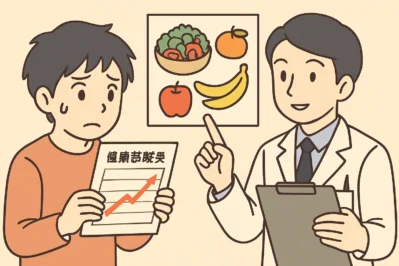Hello! This is [Maeil Hangul], here to upgrade your Korean skills!
Have you ever been to a hospital in Korea or needed to talk about your health with Korean friends? It can be tricky! But don’t worry, because today we’re going to learn how to talk about a very important topic: health check-up results.
These days in Korea, there’s a huge “self-care” (셀프 케어) trend, especially among young people. It’s become common to be proactive about health and even share experiences about annual health check-ups (건강검진) online. So, learning these phrases will not only help you at the doctor’s office but also help you connect with the latest Korean culture!
Let’s get started!
Core Expressions You Need to Know
Here are three essential phrases for discussing your health check-up results.
1. 결과가 어떻게 나왔어요?
* Pronunciation [Romanized]: Gyeolgwa-ga eotteoke nawasseoyo?
* English Meaning: How did the results come out? / What were the results?
* Detailed Explanation: This is the most natural and common way to ask about any kind of result, whether it’s a medical test, a job interview, or an exam. ‘결과’ (gyeolgwa) means “result,” and ‘어떻게 나왔어요?’ literally means “how did it come out?”. It’s a polite and versatile question you can use with doctors, friends, and family.
2. 수치가 높다/낮다
* Pronunciation [Romanized]: Suchi-ga nopda/natda
* English Meaning: The level/number is high/low.
* Detailed Explanation: This is crucial for talking about specific numbers in your results. ‘수치’ (suchi) means “numerical value” or “level.” You can attach it to specific health terms. For example, “cholesterol level” is ‘콜레스테롤 수치’ (kolleseuterol suchi) and “blood sugar level” is ‘혈당 수치’ (hyeoldang suchi). Simply combine it with ‘높다’ (nopda) for “high” or ‘낮다’ (natda) for “low.”
* Example: 콜레스테롤 수치가 높아요. (My cholesterol level is high.)
3. 관리가 필요하다
* Pronunciation [Romanized]: Gwalli-ga piryohada
* English Meaning: Management is needed. / You need to manage/take care of it.
* Detailed Explanation: This is a phrase you will often hear from Korean doctors. ‘관리’ (gwalli) means “management” or “care,” and ‘필요하다’ (piryohada) means “to be necessary.” Instead of saying “You must lose weight,” a doctor will often say, “체중 관리가 필요해요” (Chejung gwalli-ga piryohaeyo), which means “Weight management is necessary.” It’s a slightly softer, but still serious, way to give advice. It can refer to diet, exercise, stress, and more.
Example Dialogue
Let’s see how these expressions are used in a real conversation between two friends, Mina and Jinwoo.
A (Mina): 진우야, 너 지난주에 건강검진 받았지? 결과가 어떻게 나왔어?
(Jinwoo, you got your health check-up last week, right? How did the results come out?)
B (Jinwoo): 응, 다 괜찮은데 콜레스테롤 수치가 좀 높게 나왔어.
(Yeah, everything is fine, but my cholesterol level came out a bit high.)
A (Mina): 정말? 의사 선생님이 뭐라고 하셨어?
(Really? What did the doctor say?)
B (Jinwoo): 식단 관리가 필요하대. 이제 야식으로 치맥은 못 먹겠다…
(He said I need to manage my diet. I guess I can’t have chimaek (chicken and beer) for a late-night snack anymore…)
A (Mina): 아이고, 그래도 건강이 제일 중요하지! 힘내!
(Oh no, but your health is the most important thing! Stay strong!)
Culture Tip & Trend Deep Dive
- The New “Body Profile”: You might have heard of the “바디 프로필” (badi peuropeul) trend in Korea, where people work out intensely to take professional-style photos of their bodies. Recently, this trend has evolved! The Korean MZ generation now considers managing their internal health—like cholesterol and blood pressure—as part of a “smarter” self-care routine. Sharing health check-up results on social media has become a way to show that you’re responsibly taking care of yourself from the inside out.
-
Understanding “관리 (Gwalli)”: When a doctor says “관리가 필요해요,” it’s your cue to ask for more specific advice. It usually implies lifestyle changes. You can follow up by asking, “어떻게 관리해야 해요?” (Eotteoke gwallihaeya haeyo? – How should I manage it?). This shows you’re taking their advice seriously. Common types of ‘관리’ include:
- 식단 관리 (sikdan gwalli): diet management
- 체중 관리 (chejung gwalli): weight management
- 스트레스 관리 (seuteureseu gwalli): stress management
Wrap-up & Practice Time!
Great job today! You’ve learned how to ask about health check-up results, describe them using 수치가 높다/낮다, and understand the doctor’s important advice, 관리가 필요하다. These phrases will make you sound much more natural and informed.
Now, let’s test your knowledge!
- Fill in the blank:
My blood pressure (혈압) is high. -> 혈압 _________가 높아요. -
Make a sentence:
Imagine a doctor tells you that you need to manage your exercise routine (운동). How would they say it using the pattern we learned today?
Leave your answers in the comments below using the expressions we learned! We’d love to see you try them out. Until next time, stay healthy and keep learning






